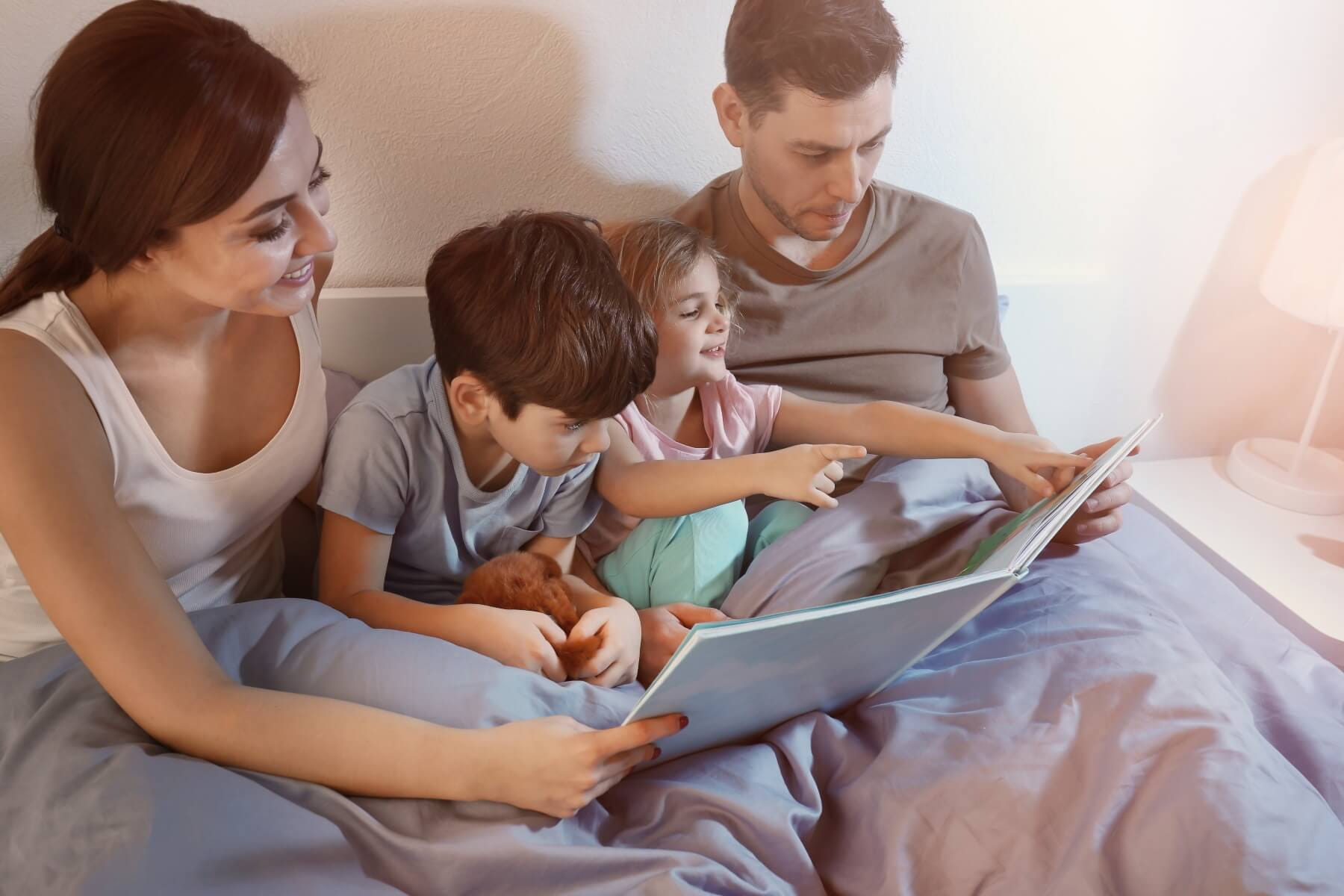
Have you ever found yourself lying in bed, tossing and turning, unable to fall asleep? If so, you're not alone. According to the National Sleep Foundation, over 30% of adults in the United States experience occasional insomnia, and up to 10% have chronic insomnia. [1]
Many people turn to various options to help them fall asleep. However, reading a book is one of the most simple and enjoyable ways to prepare your mind and body for sleep. But does it really work?
Not only can reading help you fall asleep faster, there are many other benefits to reading before bed, such as stress relief, increased vocabulary and empathy, improved memory and focus, improved sleep quality, and a healthier brain.
This article will explore whether reading helps you fall asleep and why it may be an effective sleep aid.
The Science Behind Reading and Sleep
Research has shown that reading before bed can help you fall asleep faster and improve the quality of your sleep. A study published in the Journal of Sleep Research found that reading for just six minutes before bed can reduce stress levels by up to 68%. [2] ]
This is because it uses your brain in a way that isn’t taxing enough to be stressful but still stimulates your mind. So, while you relax and read, the information gets processed and stored in a non-stressful way.
Read Study: The Advantages of Reading Books [3]
Additionally, reading can lower your heart rate, slow your breathing, and help you relax, all helpful for falling asleep.
Get Deeper and Restorative Sleep
Once you’ve grabbed your favorite book, it’s time to snuggle and enjoy the comfort of a temperature-regulated bed that won’t trap your body temperature. Enjoy all the benefits of a heated or cooling mattress topper.
Which is Best: Fiction or Non-fiction
It is generally best to read something relaxing before bed, whether it is fiction or nonfiction. Reading can be a great way to unwind and clear your mind before sleep.
Some people find that reading fiction helps them escape into a different world and forget about the stresses of the day, while others prefer nonfiction because it provides them with interesting information and can help them learn something new.
Ultimately, the best type of reading material to read before bed will depend on your personal preferences and what helps you relax.
Benefits of Reading Before Bed
Reading before bed has many benefits beyond just helping you fall asleep. For example, it can be a great way to unwind after a busy day, improving your mood and reducing stress. A recent study concluded that reading before going to sleep improved sleep quality compared to not. [4]
Reduce Stress
As the day wears on, stress can build up and weigh heavily on your mind. When you're ready for bed, it can be challenging to slow your mind and thoughts leading up to bed.
To help unwind, you can dive into a captivating book, offering a welcome escape from the pressures of the day. Research has shown that even a brief six-minute reading session can significantly reduce stress, up to 68% in some cases.
The genre or subject matter of the book isn't necessarily crucial either - whether it's non-fiction, fiction, or even a guilty pleasure read, as long as it holds your interest, it can be a helpful tool for relaxation.
Improve Imagination
Books can expand your horizons and open up new worlds of knowledge. You can explore unfamiliar realms, absorb new information, and meet fascinating characters through books. Whether you're seeking inspiration or simply looking to learn something new, they can offer an endless source of discovery and enrichment.
Gain Better Sleep
Have you ever experienced the sensation of drifting off while reading? If what you're reading happens to be dull or unengaging, it's even more likely to induce drowsiness, falling asleep faster.
Did You Know: 42% of the participants reported that their sleep improved when they read a book before bed. [5]
Remember your childhood. Bedtime stories are a cherished ritual for many young children, who insist on hearing a tale before drifting off to sleep. But why should this practice be limited to children? There's no reason why adults can't also enjoy the soothing comfort of a bedtime story to help them relax and prepare for restful sleep.

Reading to Children at Bedtime
A study revealed that 81% of parents reported that reading to their kids helps the children fall asleep and the parents themselves. [6]
Additionally, a survey found that most parents (63%) make it a habit to read to their children before bed, either always or often. On average, parents read to their kids four nights a week, emphasizing the importance of this beloved bedtime ritual.
Also, an overwhelming 78% of parents reported reading the same books they enjoyed as children to their kids, highlighting the timeless appeal and enduring value of classic children's literature.
Better Concentration
There are many reasons why reading a book can improve our concentration. Reading requires a certain level of focus and mental engagement, which can help to sharpen our attention and improve our ability to concentrate.
Additionally, when we read a book, we often immerse ourselves in a single, sustained activity for an extended period, which can promote deeper concentration. Finally, it's a mental exercise that can help to strengthen our cognitive abilities, including our capacity for sustained attention and focus.
Improve Your Vocabulary
Reading a book at night can help improve your vocabulary for several reasons. You're often exposed to a broader range of vocabulary words than you would encounter in everyday conversation. This openness to new words and language patterns can help to expand your vocabulary.
Additionally, you may find yourself more relaxed, enabling you to focus better, which can help you retain and internalize new words and concepts more effectively.
Reduce Blue Light Exposure
You won't be exposed to the blue light emissions from a screen when reading a physical book rather than an e-reader. Blue light exposure from electronic devices can interrupt your body's natural sleep-wake cycle, making it harder to fall asleep and reducing sleep quality. A study found that people who used their smartphones right before going to sleep took longer to fall asleep than those who didn’t use phones at all! [7]
Choosing the Right Type of Book
Choosing the right book is crucial if you want to use reading as a sleep aid. A book that is too exciting or stimulating can have the opposite effect and keep you awake.
Instead, try one that is calming and relaxing, such as a book on mindfulness or a romance novel. Remember that e-readers can emit blue light, which can interrupt your sleep cycles. So, select an old fashion paper book for the best results.
Book Tip: Avoid books with plots that are too action-packed or complicated. Also, books with too many characters and lots of dialogue because they're more likely to keep you awake.
If you’re interested in seeing which books to read before bed, take a look at Barnes & Noble's top list.
Tips for Reading to Fall Asleep
If you want to start reading before bed to see if it can help improve your sleep, there are a few things you can do to make the experience more effective:
- Establish a regular bedtime routine. It's important to try to read at the same time every night. Doing so can help let your body know it's time to wind down.
- Create a relaxing environment. Before you start, dim the lights, make sure your room temperature is cool and quiet, and get comfortable with a pillow and blankets.
- Sometimes we can lose track of time because we're so interested in the book; setting a timer is recommended so you don't read too late.
Sleep Tip: It's best to read no longer than 30 minutes at a time—but even better if you split that into four 15-minute increments! That way, your brain will have time to wind down before falling asleep (and won't be trying so hard when it does).

Print vs. Digital Books
Reading a good book can be a more tactile and sensory experience. The feel of the pages, the sound of turning them, and the smell of the ink and paper can all contribute to a relaxing and enjoyable experience.
Additionally, reading a physical book can help reduce your exposure to blue light, which can interfere with your natural sleep cycle. Most e-readers emit blue light, which has been shown to suppress the production of melatonin, a hormone that helps regulate sleep.
E-readers can offer several advantages over paper books, particularly regarding convenience and accessibility. You can carry an entire library of books wherever you go and adjust the font size and style to suit your preferences. Many have built-in lighting that can be adjusted to reduce eye strain and help you read comfortably in low-light environments, such as your bedroom.
Ultimately, your best choice may depend on your preferences and sleep habits. If you find that reading a paper book helps you relax and fall asleep more quickly, stick with that. If you prefer the convenience and portability of an e-reader, that may be a better choice for you.
What About Audiobooks?
A study by researchers at the University of Florida and Harvard Medical School found that listening to audiobooks helps individuals with insomnia feel at ease and fall asleep faster.
Participants who listened to an audiobook before bedtime felt more relaxed, slept better, and had less trouble falling asleep than those who didn't listen to an audiobook.
Why Bedtime Reading May Not Work for Everyone
While reading before bed is generally considered a safe and effective way to fall asleep, it may only work for some. For example, if you have a condition such as sleep apnea or restless leg syndrome, it may not be enough to help.
Top Books on Sleep & Sleep Hacks
- Why We Sleep: Unlocking the Power of Sleep and Dreams, Matthew Walker
- The Sleep Solution: Why Your Sleep is Broken and How to Fix It, W. Chris Winter, MD P.S. We’re fans of page 110 :)
- Tools of Titans: The Tactics, Routines, and Habits of Billionaires, Icons, and World-class Performers , Tim Ferriss (We love pages 139-140 where Tim talks about the Chilipad)
- Life Force: How New Breakthroughs in Precision Medicine Can Transform the Quality of Your Life & Those You Love , Tony Robbins, Peter H Diamandis, Robert Hariri (Chilipad is mentioned in Chapter 13)
- Boundless: Upgrade Your Brain, Optimize Your Body & Defy Aging , Ben Greenfield
- Reprogram Your Sleep , Tara Youngblood (Tara is the original co-founder of Chilipad)
- The Energy Formula , Shawn Wells (Again - we’re blushing as Shawn mentions us on pages 210 & 225).
Conclusion
We know it can be difficult to get into the habit of falling asleep with a book in hand, but there are so many benefits to doing so!
So if you’ve been wondering a new way to get a good night’s sleep, consider picking up your favorite novel next time you go to bed. It can help encourage better sleep; by promoting relaxation and reducing stress.
Resources
[1] “Chronic Insomnia - an Overview | ScienceDirect Topics.” View Resource www.sciencedirect.com/topics/psychology/chronic-insomnia.
[2] Lewis, D. (2009), Galaxy Stress Research. Mindlab International, Sussex University, UK
[3] Finucane, E., O'Brien, A., Treweek, S., Newell, J., Das, K., Chapman, S., Wicks, P., Galvin, S., Healy, P., Biesty, L., Gillies, K., Noel-Storr, A., Gardner, H., O'Reilly, M. F., & Devane, D. (2021). Does reading a book in bed make a difference to sleep in comparison to not reading a book in bed? The People's Trial-an online, pragmatic, randomised trial. Trials, 22(1), 873. View Study
[4] Bavishi, A., Slade, M., & Levy, B. (2017). THE SURVIVAL ADVANTAGE OF READING BOOKS. Innovation in Aging, 1(Suppl 1), 477. View Study
[5] Finucane, E., O'Brien, A., Treweek, S., Newell, J., Das, K., Chapman, S., Wicks, P., Galvin, S., Healy, P., Biesty, L., Gillies, K., Noel-Storr, A., Gardner, H., O'Reilly, M. F., & Devane, D. (2021). Does reading a book in bed make a difference to sleep in comparison to not reading a book in bed? The People's Trial-an online, pragmatic, randomised trial. Trials, 22(1), 873. View Study
[6] Finucane, E., O'Brien, A., Treweek, S., Newell, J., Das, K., Chapman, S., Wicks, P., Galvin, S., Healy, P., Biesty, L., Gillies, K., Noel-Storr, A., Gardner, H., O'Reilly, M. F., & Devane, D. (2021). Does reading a book in bed make a difference to sleep in comparison to not reading a book in bed? The People's Trial-an online, pragmatic, randomised trial. Trials, 22(1), 873. View Study
[7] ThriftBooks. (n.d.). Storytime Evolution. ThriftBooks.






